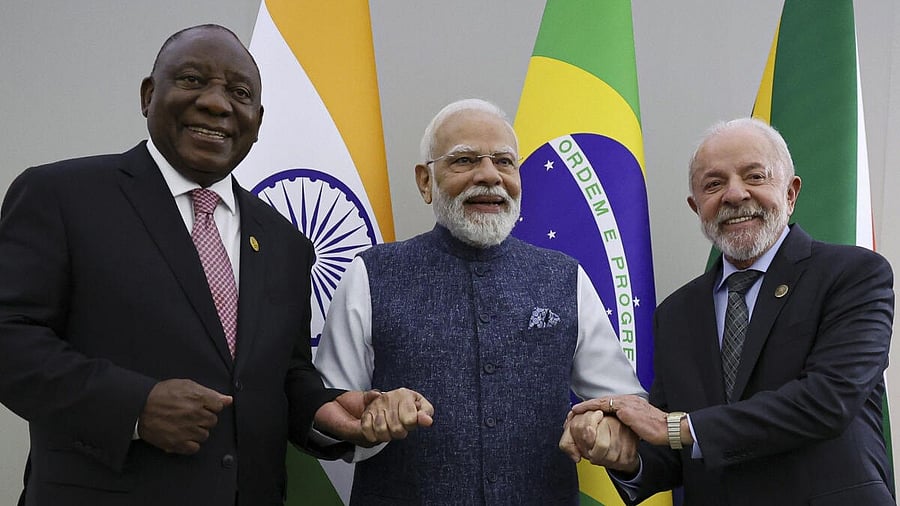
In this image posted on Nov. 23, 2025, Prime Minister Narendra Modi with South African President Cyril Ramaphosa and Brazilian President Luiz Inacio Lula da Silva during the India-Brazil-South Africa (IBSA) leaders summit, on the sidelines of the G20 Leaders' Summit, in Johannesburg, South Africa.
Credit: @PMOIndia/X via PTI Photo
New Delhi: Global governance institutions are far removed from 21st-century realities, said Prime Minister Narendra Modi as he was joined by his counterparts, Brazil's Luiz Inácio Lula da Silva and South Africa's Cyril Ramaphosa, for a meeting of the IBSA leaders on the sidelines of the G20 summit in Johannesburg on Sunday.
Ramaphosa hosted the summit of the IBSA — a bloc comprising India, Brazil, and South Africa.
Modi called on IBSA to send a strong message that reform of institutions of global governance — in particular the UN Security Council (UNSC) — was no longer an option but an imperative. He also proposed an IBSA Fund for climate-resilient agriculture.
The IBSA leaders met amid all three constituents finding themselves at the receiving end of US President Donald Trump's tariff tirade. Trump imposed a 50% tariff on imports from India and Brazil to the US, and 30% on South Africa’s exports.
Describing the IBSA meeting as "timely", Modi noted that it coincided with the first G20 Summit in Africa and marked the culmination of four consecutive G20 presidencies by Global South countries, of which the last three were IBSA members. This, he noted, resulted in several important initiatives focused on human-centric development, multilateral reform, and sustainable growth.
“We must work in close coordination in the fight against terrorism. On an issue of such gravity, there can be no room for double standards. For the sake of global peace and prosperity, united and decisive action is essential,” he said during the IBSA meeting.
Highlighting technology's crucial role in ensuring human-centric development, Modi proposed establishing an "IBSA Digital Innovation Alliance" to facilitate the sharing of digital public infrastructure like UPI, health platforms like CoWIN, cybersecurity frameworks, and women-led tech initiatives.
He also emphasised the IBSA's potential to contribute to the development of safe, trustworthy, and human-centric AI norms.
He also said the grouping could complement each other's development and become an example for sustainable growth.
He highlighted cooperation opportunities in areas such as millets, natural farming, disaster resilience, green energy, traditional medicines and health security.
“Today’s world appears fragmented and divided on many fronts. In such a time, the IBSA can offer a message of unity, cooperation, and humanity. This is both our responsibility and our strength as three democratic nations,” said Modi.
“With the support of the IBSA Fund, we have implemented nearly 50 projects across 40 countries. These initiatives, ranging from education and health to women’s empowerment and solar energy, have been shaped by the needs of local communities,” he said.
